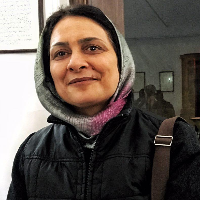The role of place identity components in the economic development of peri-urban areas(Case study: Rasht city)
The development of peri-urban areas, as one of the main concerns that includes various economic and social aspects, is one of the fields of attention of national governments and local governments. An arena that, with the expansion of global communications, has concentrated its field of action in unique narratives of cultural, social and geographical features. Attractive narratives that have taken responsibility for the development of diverse geographical locations and put the presentation of competitive advantage and identity components on the shoulders of local and regional micro-levels.
The research strategy used in this research is "grounded theory". Contextual theorizing uses a methodology that requires the simultaneous and chain-wise collection and analysis of data. In total, about 63 economic activists were interviewed in the mentioned areas, of which 58 interviews were conducted for appropriate research and reports. Finally, through the interviews conducted in this field, the narratives of the place's identity that are used in different economic sectors from production and trade to services for the development of businesses are received and With the proposed triple coding, an attempt is made to extract the mechanism from which economic actors try to benefit from the elements of place identity for the development of their economic income.
The answers obtained from this interview and coding process clearly explain that the components of place identity which are: "Language, food, sound and music, architecture and space-making, history, place, color and handicrafts" through the main category, "activism and advertising-media policies" by creating awareness and knowledge of products. [Place - Goods - Service] among the "audiences" or in a better word "customers" find improvement and economic prosperity. A strategy that, in a process model, leads to perception after creating awareness of the products in this stage and finally achieves a change in the behavior of the audience. Of course, the mentioned path is not simple and one-line, and two categories of "background conditions" and "intervening conditions" play a role step by step in this path in the direction of intensity and strength or creating obstacles:"Contextual conditions" are actually environmental platforms that provide the strength or weakness of this mechanism: "Demographic components" such as age and education, "family" as the main element transmitting historical and cultural heritage, "social capital" and the strength of the network of relationships based on it are among the contextual conditions. It is decided that the role-playing mechanism of place identity components in economic development must pass through this channel. "Intervening conditions" are types of external stimuli that can play a role in strengthening or weakening the mentioned mechanism. Intervening conditions in this mechanism can be divided into three parts: "immigration and cultural interactions", "urban-institutional policies", "taste-making cultural consumption".However, the main category that has been left out of the coding process in the mechanism of benefiting from the components of place identity in the direction of economic development is "activism and advertising-media policies". which plays a role in both individual and collective dimensions. A category whose role is more important than anything else in the semantic link with the commercial brand. A commercial brand means creating value through strengthening and representing the assets of a place in a coherent way, which is presented in an image and narrative of that place. A commercial brand is actually the sale of stories [narrative assets] that are made of material assets. The key insight in this view is that a place like a city can be considered as a product. Or, in a more pioneering stage, a city is a collection of various products that can be made into extensive exchanges by processing their raw material in the form of narrative products. And in this way, a city can take advantage of its talents and take the path of its development by relying on its capabilities.
Therefore, what can be important in the process of local economic development are the narratives that are presented about the identity of the desired place, because value emerges through narratives. Some narratives are more attractive and some have less motivating features. In this way, the object of exchange is "narrative" and the value of goods is measured by the narratives that support them. As a result, the task of value creation is the responsibility of the narration. The remarkable issue is that narratives are always evolving and unpredictable; As the images of the place, products or lifestyle change, the relationship of the product, place and narrative are also re-evaluated and reconstructed. As a result, what is important in the process of studying the role of place identities in local economic development is to pay attention to the mechanism that transforms place identities into a tool for the production of added value and finally economic development. Identities that, as a catalyst, cultural, geographical, historical, etc. characteristics of a place create value in the form of narratives for manufactured goods and services and they become a tool for economic development at the local level.
peri-urban , Development , identity , Narration , Economy
-
Thematic Analysis of the Demands of the Right to the City Between the Residents of the New City of Pardis
Nima Jafari, Mahmoud Sharepour *,
Journal of SHAHR-HA, -
Demographic Considerations of Social Responsibility
*, Fereshteh Soltani
Journal of Population Association of Iran, -
The effect of oil price shocks on the stock market returns of selected oil exporting countries (variable parameter regression approach over time)
Yousef Mehnatfar *, Zeinab Ramezani Darabi, Zahra Karimi Moghri
Macroeconomics Research Letter, -
Quantum Holistic Phenomenological Approach; a New Perspective to the Institution and Institutional Changes
Mohammadtaghi Gilak Hakimabadi *, Aboozar Moradi,
Metodology of Sicial Science and Humanities,



